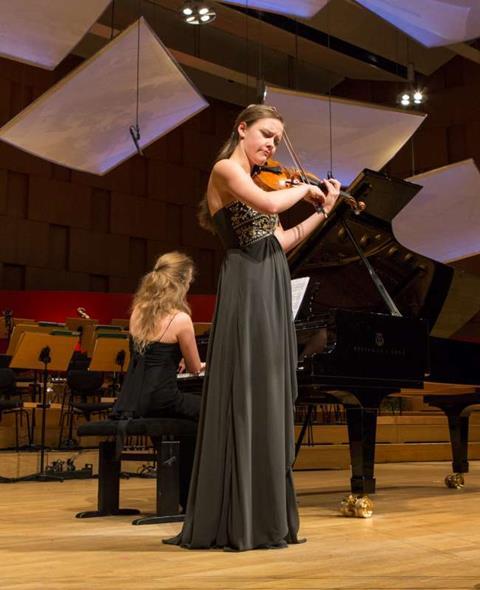In an extract from his memoirs, published in The Strad, January 1914, orchestral violinist William Quirke recalls Richard Wagner's arrival in London in 1877 for a series of concerts of his own work

“RECOLLECTIONS OF A VIOLINIST”
BY W. M. QUIRKE
THE immortal Wagner is coming to London when at the zenith of his
glory. A large orchestra is engaged for a series of ten
concerts.
On a particular day, the first rehearsal is held in the lower room
of St. James’ Hall (now demolished), beginning at 10 o’clock, and
expected to last till about 3 in the afternoon, the work selected
being “Das Rheingold,” and Herr Wagner to take the baton, although
Hans Richter is looked upon as the probable conductor of the
festival. The orchestra members containing something like fifty
first, and fifty second violins. The descriptive music of the
Rhine, which opens the work, gives a deal for the second violins to
do, and is exceedingly difficult to perform.
The members of the orchestra are all in their places when Herr
Wagner appears, descending some steps, followed by Herren Richter
and Franke. By some strange accident, in descending Herr Wagner has
his hat crushed though coming in contact with some projection, and
this gives a most undignified, if not comical appearance, as,
strutting into the room, he approaches the orchestra, assuming a
very haughty air. Those in his immediate presence seem to look at
him with too much awe to propose taking off his hat and restoring
it to a proper shape. Amongst the English members of the orchestra
the incident provokes unmistakable signs of merriment, as the
individual players call each other’s attention to the condition of
the hat. But this is not shared by the German members of the
orchestra, who view the English conduct in the matter as almost
sacrilegious and most reprehensible. Herr Wagner, noticing this
hilarity, and not divining the cause, glares at the perpetrators
with surprise and disgust. However, a tap with the baton, and the
rehearsal begins.
The second violins with their long, rolling arpeggi, like waves,
make the atmosphere quite damp with the water of the Rhine, and
this is more strongly emphasised, as, after the rehearsal, I see
two or three members of the orchestra causing a small crowd to
collect as they pretend to wring water from the tails of their
frock coats. The work has not proceeded far before the conductor
taps his desk violently, and shouts, “Zuruck” (“Again”). A fresh
start is made, but ere long another misunderstanding, this time
through the conductor, who, carried away by the music, relinquished
his baton, expecting this huge machine to follow a beat, given only
with one of his fingers on his shirt-stud. This time, white with
ill-concealed rage, the composer turns to Richter, and walking to
and fro, repeats the word “Schlecht” two or three times. This
little performance is not lost on the English portion of the
orchestra, who, seemingly, unable any further to control their
mirth burst into an unmistakable chuckle, to the consternation of
the German and other foreign elements.
Here Herr Deichman, leader of the second violins, springs to his
feet, and passionately tapping the music stand with his bow, says,
in bad English, “It is no tink to laugh.” So violently does he
strike his deck, that the little piece of ivory at the top of his
bow flies across the room, and strikes Herr Wilhelmj in the face.
This last occurrence draws perfect howls of laughter, in which a
good number of the foreign section freely join. Herr Wagner is by
this time in a frenzy of passion. But this is the opportunity for
that perfect tactician, Herr Richter, who, taking the great
composer by the arm, leads him away, speaking in a soothing,
conciliatory tone. The orchestra in the meantime indulge in
unrestrained jubilation. In a few moments the conductor returns,
without Herr Wagner, and with the baton in his hand, says only two
words: “Now, boys!” Every man in that orchestra looks back to
the eye which seems to read into their very souls, as, electrified
by the wonderful personality of the great conductor, each one
pushes his chair nearer to his music-stand, and a volume of sound,
as if from one instrument, conveys to the ear the glorious effects
in that wonderful conception of one of the greatest musical and
dramatic geniuses of the century.
Subscribe here, or download our digital edition as part of a 30-day free trial.








































No comments yet